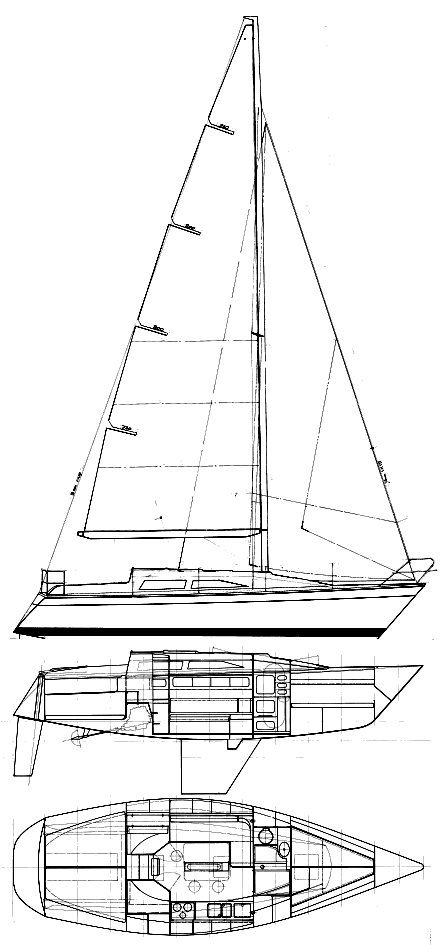The Friendship 33 is a well-regarded monohull sailboat that emerged from the shipyards of Friendship Yachts in the Netherlands, a builder known for its commitment to robust construction and practical design. Produced from 1985 to 1995, this vessel was conceived as a dependable cruising sailboat, balancing comfortable accommodations with spirited sailing characteristics. Designed by E.G. van de Stadt, the Friendship 33 quickly gained a reputation for its splendid maneuverability and suitability for both coastal cruising and longer voyages.
Friendship 33 Information, Review, Specs

- Make
- Friendship
- Model
- 33
- Number Built
- Production Year(s)
- 1985 - 1995
History and Design
The genesis of the Friendship 33 aligns with Friendship Yachts' vision under Anton and Hetty Meijer, who steered the company towards creating accessible, well-built sailing yachts that offered both comfort and reliable performance for cruising enthusiasts. The 33-foot model, designated as VDS design #397, represents a period when fiberglass construction had become the material of choice for its durability and low maintenance. While not widely associated with a single famous naval architect, the consistent quality and functional design across Friendship's range, including the 33, reflect an adherence to proven and effective principles of naval architecture that resonated with the cruising community. The Friendship 33 was introduced in 1985, building upon the builder's success with models like the Friendship 22 and 28, and remained in production for a decade until 1995. Some versions were equipped with a shallow wing keel, which broadened the boat's sailing area by allowing access to shallower waters.
Sailing Performance and Handling
The Friendship 33 is characterized by a fractional sloop rig and a fin keel with a spade rudder, a combination praised for providing splendid maneuverability. With a sail area to displacement ratio of approximately 18.44, the Friendship 33 exhibits good light-air performance, indicating that it can move well even in lighter winds. Its ballast to displacement ratio of around 0.39 suggests a reasonably stiff and stable boat, capable of standing up to a decent amount of wind without excessive heeling. The displacement to length ratio of approximately 243.2 places the Friendship 33 in the category of a moderate displacement cruiser, offering a good balance between speed and comfortable motion in a seaway. Owners often highlight its good sailing capabilities and overall balance, making it a pleasant boat to handle under various conditions.
Accommodations and Layout
The interior of the Friendship 33 is noted for being more spacious than many comparable sailboats, suggesting a design focus on maximizing living volume. Typically, the layout includes up to seven berths, making it suitable for families or those cruising with guests. Information from sales listings and owner discussions indicates a comfortable interior, often featuring a traditional varnished wood finish. While specific headroom figures are not consistently available, the design aimed for practical and comfortable cruising. Owners often appreciate the solid construction of the interior and the use of space-saving sliding doors. Standard configurations generally include a V-berth forward, a main salon with settees that convert to berths, a galley, and a head.
Owner's Perspectives
Owners of the Friendship 33 generally laud its well-built nature and good sailing characteristics. The boat is often described as a "splendid and well maintained sailing yacht with good sailing capabilities," emphasizing its enduring quality. The comfortable interior and practical layout are frequently cited as strengths, making it an ideal vessel for family cruising. However, some discussions among owners suggest potential areas for attention, such as ensuring proper mast support to prevent issues around the mast step, a concern sometimes noted in related Friendship models. Overall, the Friendship 33 maintains a positive reputation in the used boat market, particularly in the Netherlands and wider European markets, where its practical design, sturdy construction, and forgiving sailing characteristics are highly valued.
Measurements
Construction & Hull
- Construction Material
- Fiberglass (Solid)
- Hull Type
- Monohull Sailboat
- Keel Type
- Fin
- Rudder
- 1x Spade
- Ballast
- 3726 lbs
- Displacement
- 9480 lbs
- Water Capacity
- 53 gal
- Fuel Capacity
- 13 gal
Engine
- Engine Make
- Volvo Penta
- Engine Model
- —
- Engine Type
- —
- Engine HP
- —
- Engine Count
- 1
- Drive Type
- —
- Fuel Type
- Diesel
Rig & Sails
- Rig Type
- Fractional Sloop
- P (Main Luff)
- -
- E (Main Foot)
- -
- I (Foretriangle Height)
- -
- J (Foretriangle Base)
- -
- Forestay Length (est)
- -
- Main Sail Area
- -
- Foretriangle Sail Area
- -
- Total Sail Area (Reported)
- 519 sqft
- Total Sail Area (Calc)
- -
Dimensions
- LOA
- 33.63 ft
- LWL
- 25.92 ft
- Beam
- 10.83 ft
- Draft
- 6.07 ft
- Max Headroom
- -
- Air Draft
- -
Calculations
- Hull Speed
- 6.82 kn
- Pounds per Inch Immersion
- 1